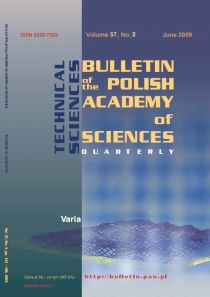POLISH ACADEMY of SCIENCES
TECHNICAL SCIENCES

| BULLETIN
of the
POLISH ACADEMY of SCIENCES TECHNICAL SCIENCES |
 |
|||
|---|---|---|---|---|
| Volume
58, Issue 1, March 2010
|
||||
| Issue Index | Authors Index | Scope Index | Web Info | |
|
|
||||
| Aims&Scope, Subscription | Editors | Authors' guide | to read PDF files | mirror: http://fluid.ippt.gov.pl/~bulletin/ |
| pp 197 - 207 |
|---|
|
Application of L1-impulse method to the optimization problems in power theory |
|---|
| M. SIWCZYNSKI and M. JARACZEWSKI |
|
In optimization power theory we can distinguish the three approaches:
where ||u|| = √(u, u), ||i|| = √(i, i). This inequality causes numerous optimization problems, among which the norm of the current minimization is the most important one: (u, i) - P = 0. Whereas the theory of instantaverage power values joins both aforementioned methods and uses socalled 'instant active power': 197.gif) The mathematic methods used in these theories derive from the theorems of signals and instant power modulation. This article deals only with the average power theory which uses the L1 impulses as an alternative to the Fourier series method. This technique is efficient when the energy is transmitted with highly distorted periodic signals. |
| Key words: |
|
periodically timevarying networks, operational calculus, stability, synthesis, optimization |
|
|
| Issue Index | Authors Index | Scope Index | Web Info |
|---|---|---|---|
|
|
|||
| Aims&Scope, Subscription | Editors | Authors' guide | to read PDF files |
| Copyright ® Bulletin of the Polish Academy of Sciences: Technical Sciences |
|---|